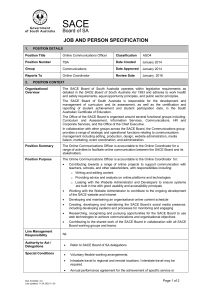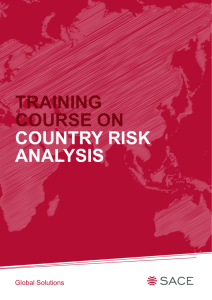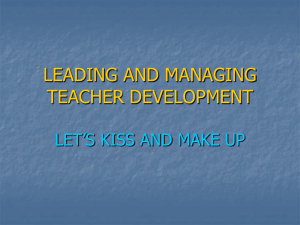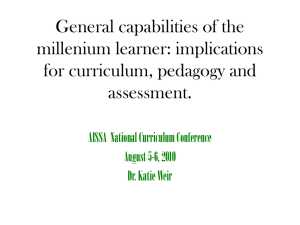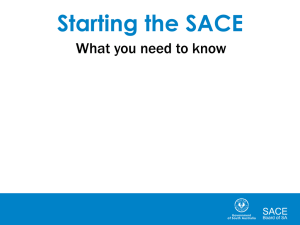PowerPoint presentation - Community Learning (PPT 1MB)
advertisement
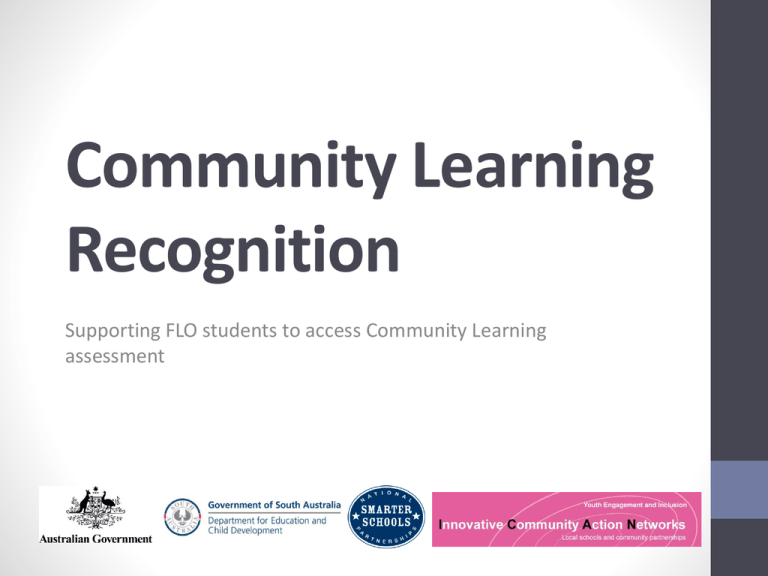
Community Learning Recognition Supporting FLO students to access Community Learning assessment The SACE What is Community Learning? The SACE Board recognises that learning doesn't just happen in the classroom, but in all kinds of settings. Community learning recognition is a way of students gaining SACE credits for the community activities or services they have been undertaking. Community Learning Community Learning contributes to the 90 Stage 1 or Stage 2 ‘other’ (or ‘blue’ section in the diagram) section of the SACE. Community Learning does not contribute to the compulsory requirements of the SACE. Community Learning SACE students can earn credits for community service or activities in two ways: Community-developed programs through a current award or certificate from a community-developed program, such as those offered by the Royal Life Saving Society or the Duke of Edinburgh's Award. Self-directed community learning such as taking care of a family member, supporting a refugee family, or volunteering for a community project. To gain recognition for this kind of community learning, students need to show evidence about what they have learnt. Self Directed Programs http://www.sace.sa.edu.au/subjects/recognised-learning/community-learning/selfdirected-programs Self-directed Community Learning may be gained through learning experiences that do not follow a formal, accredited curriculum. Individual students may participate in a range of programs or sets of activities that are not formally accredited. What can count towards Community Learning? The Interview…. The student will need to attend an interview where they will provide evidence of their learning to a Community Learning assessor(s). The student is assessed against two assessment criteria: • knowledge and application • reflection and critical thinking What is the process… 1. Young person, case manager, FLO Coordinator discuss applying for recognition 2. Young person completes the application form 3. School approves the application 4. The school notifies the student of approval for an interview 5. The school arranges the interview with the student 6. Case Manager assists young person to prepare for the interview 7. Young person is interviewed 8. School records the result 9. School retains the evidence What can Case Managers do… Prior to the interview: • Recognise if young people are involved in any community learning that could be accredited • Negotiate with the local FLO coordinator for this to happen • Support the application process • Prepare students for the interview (including support materials) • Attend the interview with the young person if needed What can Case Managers do… During the interview: • Monitor wellbeing • Reduce anxiety • Support student’s to navigate the questions • Don’t tamper with the evidence • Prompt the use of support materials The questions… Knowledge and Application Reflection and Critical Thinking • Opening questions • Questions about the student’s selfperception • Experience • What the student says about learning • Questions about breadth and depth of learning • Questions about applying learning • Questions about the student’s reflection – thinking about own learning • Questions about the student’s reflection – thinking about interacting with others How can it work for FLO students? • FLO students will need to access the Community Learning recognition through their enrolling school • FLO coordinators can provide information about the availability of Community Learning Assessors, local school process and support access to Community Learning Interviews for FLO students • FLO funding can be used to support this process For further info SACE Board Website http://www.sace.sa.edu.au/subjects/recognised-learning/community-learning Louise Johnson SACE Officer - Recognised Learning Phone: (08) 8372 7456 louisej@saceboard.sa.gov.au Your local FLO Coordinator



